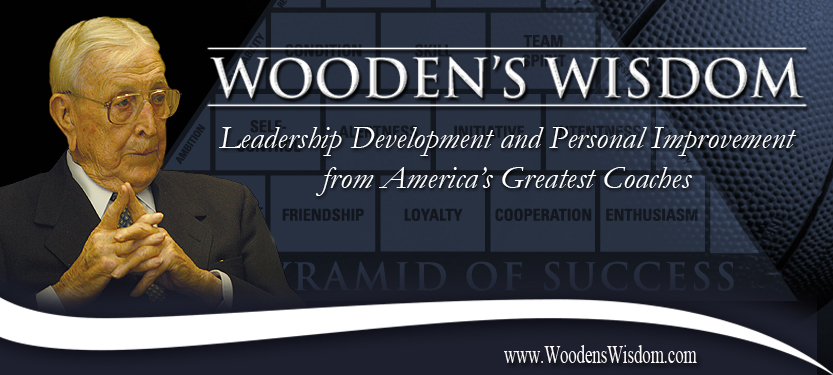 |
|
| Wooden's Wisdom - Volume 1 | Issue 11 |
| Craig Impelman Speaking | Championship Coaches | Champion's Leadership Library Login | |
|
YESTERDAY’S LOSS CAN PRODUCE TOMORROW’S SUCCESS
March 15, 1963, Provo, Utah: Arizona State defeats UCLA 93-79 in the first game of the NCAA Western Regional Tournament . . . and the final score made the game sound closer than it was. Arizona State was leading 62-31 at halftime.

That season was Coach Wooden’s 17th at UCLA; that appearance was his fifth NCAA tournament, and in those tournament games, he had a painful record of only three wins and nine losses.
But something was different about this particular game. Coach Wooden had just added a new dimension to his defense: a full-court 2-2-1 zone press that was designed to force teams to shoot the ball quickly. It had worked to perfection in the Arizona State game; the Sun Devils were forced over and over again to shoot the ball quickly. Unfortunately for UCLA, they couldn’t miss a shot.
But Coach Wooden liked what he saw.
The final score did not discourage Coach or cause him to panic because of his philosophy: “Success is peace of mind which is a direct result of self-satisfaction in knowing that you made the effort to do the best of which you are capable.“
To break down his point further, Coach included some explanations of how this philosophy of success applied to his overall approach to coaching:
1. “In my opinion, a mark received in class is no more valid a way to judge the success of a student than scores validly determine the success of a sporting event. It may determine a winner but not necessarily success.“ 2. “If you truly do your best, and only you really know, then you are successful and the actual score is immaterial whether it was favorable or unfavorable."
Coach Wooden said that although Arizona State had broken the press quickly and shot the ball extremely well, he liked the effect that the press had on them. He thought Arizona State had just had a great day shooting and they would've been equally effective against whatever defense he had played. In spite of the score that came down against his own team, Coach was very pleased with the way the 2-2-1 press sped the game up. He decided that, in spite of the loss, he would keep the 2-2-1 press and bring it back the next year as the primary activator of his defense.
March 20, 1965; New York City: The best high school player in the country, Lewis Alcindor (later known as Kareem Abdul Jabbar), watches the telecast of UCLA winning their second consecutive National Championship defeating Michigan 91-80 using their now-famous 2-2-1 press to speed the game up. Alcindor decides UCLA might be the place he wanted to play because he liked their pressing/fast break style.
March 31, 1975; San Diego California: UCLA defeats Kentucky 92-85 to give John Wooden his 10th National Championship in the last 12 seasons. Since that loss at Arizona State in 1963, Coach Wooden has now enjoyed a record of 44 wins and one loss in the NCAA Tournament. This includes seven straight National Championships and 38 consecutive wins in tournament games – and the 2-2-1 press had been a key ingredient.
Sometimes when an individual, team or business faces a loss, they want to change their strategy and try something new just because they aren’t happy about the final numbers. Instead of looking at the big picture application of the lessons learned or the overall implications of the game, they are quick to embrace something different just because they are desperate to see a different result on the scoreboard. Those thinkers are sometimes referred to as “The Idea of The Month Club.“
It’s lucky for UCLA fans that John Wooden’s definition of success prevented him from joining that club.
“Not all change is progress, but there is no progress without change.“ – John Wooden
Yours in coaching,
Craig Impelman www.woodenswisdom.com
Twitter: @woodenswisdom
|
DON'T QUIT
When things go wrong,
as they sometimes will, When the road you're trudging
seems all up hill, When the funds are low
and the debts are high, And you want to smile,
but you have to sigh, When you need to laugh,
but start to cry When you must choose life,
but want to die When care is pressing
you down a bit, Rest if you must;
but just don't quit. Life is hard
with its twists and turns, As every one of us
sometimes learns, And many a failure
turns about When you might have won
had you stuck it out; Don't give up,
though the pace seems slow; You might succeed
with one more blow. Success is failure
turned inside out; The silver tint
of the clouds of doubt; And you never can tell
how close you are, It may be near
when it seems so far; So stick to the fight
when you're hardest hit; It's when things seem worse
that you must never quit. Author unknown
|
|
For more information visit www.woodenswisdom.com |
|
© Copyright 2026 WoodensWisdom.com | # of Times Wooden's Wisdom Issues Opened: 7,826,187
Hosting & Design by:EverydayWebDesign.com